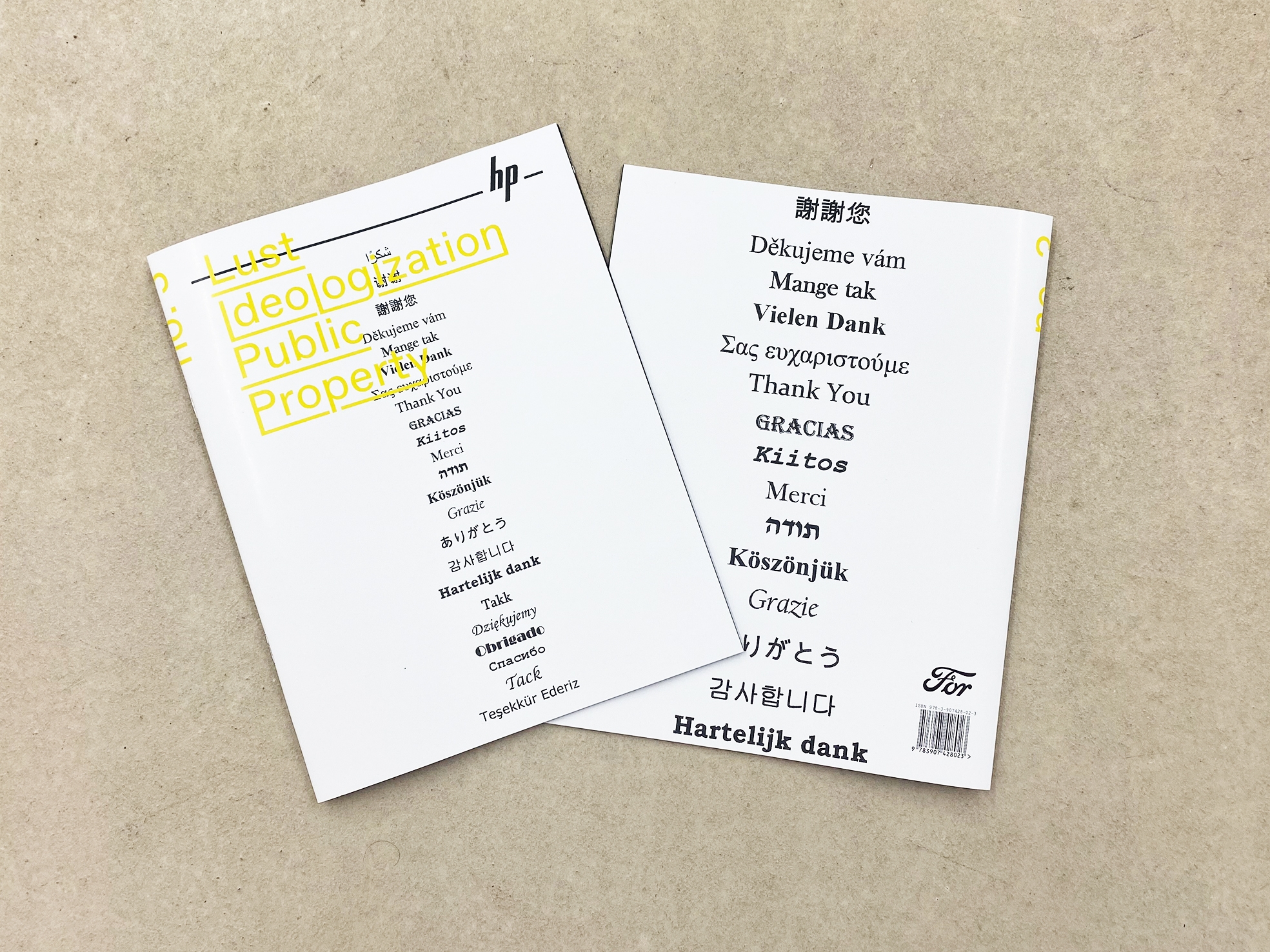No.3 Lust Ideologization Public Property
Jonas Aebi, Melanie Bühler, Ophir Darki, Esther Gajek, Judith Kakon, Jiajia Zhang
buy print version (CHF 15 + shipping)
annual subscription (CHF 60 + shipping)
download PDF version
[EN] “Cow” does not simply mean that spotted or non-spotted animal living in the Swiss Alps, on the streets of Agra or in factory farming. Nor is the “Baselstab” simply a bishop’s crook, an ancient Egyptian insignia or a hippocampus, symbol of emotion or male pregnancy. The denotation – the neutral literal meaning – does not exist. This seems to have become clear by 1973 with Stuart Hall’s famous essay “Encoding Decoding.” The meaning of a word, a symbol or a Christmas star is only completed in the process of decoding, which gives us a certain power over interpretation. The supposed denotation is, thus, always a connotation, of which there are many, but only one with which most agree. It is this dominant reading that feeds the misunderstanding that there is a literal and, therefore, neutral meaning. A misunderstanding that Hannah Arendt describes as the banality of evil. Dominant discourses may hijack meanings and fading ideologies lose interpretive authority. Desire for consumption is mirrored in the consoling glow of Christmas lights, as we have learned to communicate our love to our loved ones through commodities. But the will to understand the glowing stars in this way is waning, and the time seems ready for a collective reinterpretation: Lust Ideologization Public Property starts with a conversation between Judith Kakon, Jiajia Zhang and Melanie Bühler about the public sphere of emotions, care in the swirl of the digital, and the exhibition space as an opportunity to encounter the familiar in new ways. Against this backdrop, Jonas Aebi leads us across delicate, sacred ground into the contradictory nature of the critical discourse that in Basel is both enabled by real estate returns and contributing to their existence. Aebi presents the city as an oeuvre and reveals the extent to which urban soil in Basel is not subject to truly democratic control. The question of control is also explored by Ophir Darki, who outlines a conjuncture of urban exhibitionism and voyeurism. In the midst of an ongoing erotic revolution, the question arises as to who determines and measures sexual arousal and when we speak of sexual harassment. Finally, Esther Gajek takes on the Christmas family party as an object of ideological interpretation and, with the help of a historical view on Nazi Germany, shows how familiar customs can be reinterpreted and how dominant values can be ritually affirmed.
Lust Ideologization Public Property stands in dialogue with the exhibition commuted, ordered, incited, assisted or otherwise participated by Judith Kakon.
[DE] „Kuh“ bedeutet nicht einfach jenes gefleckte oder nicht gefleckte Tier, das in den Schweizer Alpen, auf den Strassen von Agra oder in Massentierhaltung lebt. Auch der „Baselstab“ ist nicht nur Bischofsstab, alt-ägyptische Insigne oder Hippocampus, Symbol für Emotion oder männliche Schwangerschaft. Die Denotation – die neutrale wörtliche Bedeutung – gibt es nicht. Das scheint spätestens mit Stuart Halls Aufsatz „Encoding Decoding“ von 1973 deutlich geworden zu sein. Die Bedeutung, von einem Wort, Symbol oder Weihnachtsstern, wird erst im Prozess der Interpretation vervollständigt, wodurch uns eine gewisse Macht in der Deutung zukommt. Vermeintliche Denotation ist also immer schon Konnotation, von der es viele gibt, aber meist nur eine, mit der die meisten übereinstimmen. Diese dominante Lesart ist es, die das Missverständnis nährt, es gäbe eine wörtliche und deshalb neutrale Bedeutung. Ein Missverständnis, das Hannah Arendt mit der Banalität des Bösen umschreibt. Dominante Diskurse mögen Bedeutungen kapern und verblassende Ideologien an Deutungshoheit verlieren. In das tröstende Licht der Weihnachtsbeleuchtung hat sich das Bedürfnis nach Konsum eingeschrieben, denn wir haben gelernt, unseren Liebsten unsere Liebe durch Waren zu vermitteln. Aber der Wille, die leuchtenden Sterne so zu verstehen, lässt nach, und die Zeit scheint bereit, eine kollektive Umdeutung zu vollziehen: Lust Ideologization Public Property startet mit einem Gespräch zwischen Judith Kakon, Jiajia Zhang und Melanie Bühler über Öffentlichkeit von Emotionen, Care im Sog des Digitalen und den Ausstellungsraum als Chance, um Vertrautem neu zu begegnen. Vor diesem Hintergrund führt uns Jonas Aebi über heiklen, heiligen Boden in die Widersprüchlichkeit des kritischen Diskurses, der in Basel sowohl durch Immobilienrendite ermöglicht wird, als auch zu deren Bestehen beiträgt. Aebi präsentiert die Stadt als Œuvre und macht sichtbar, inwiefern städtischer Boden in Basel keiner wirklich demokratischen Kontrolle unterliegt. Der Frage nach Kontrolle geht auch Ophir Darki nach und skizziert eine Konjunktur des urbanen Exhibitionismus und Voyeurismus. Inmitten einer anhaltenden erotischen Revolution stellt sich die Frage, wer sexuelle Erregung bestimmt und misst und wann wir von sexueller Belästigung sprechen. Zum Schluss nimmt sich Esther Gajek dem weihnächtlichen Familienfest als Gegenstand ideologischer Deutung an und zeigt mithilfe eines historischen Blicks auf Nazi-Deutschland auf, wie vertrautes Brauchtum umgedeutet und dominante Werte rituell verfestigt werden können.
Lust Ideologization Public Property steht im Dialog mit der Ausstellung commuted, ordered, incited, assisted or otherwise participated von Judith Kakon.
